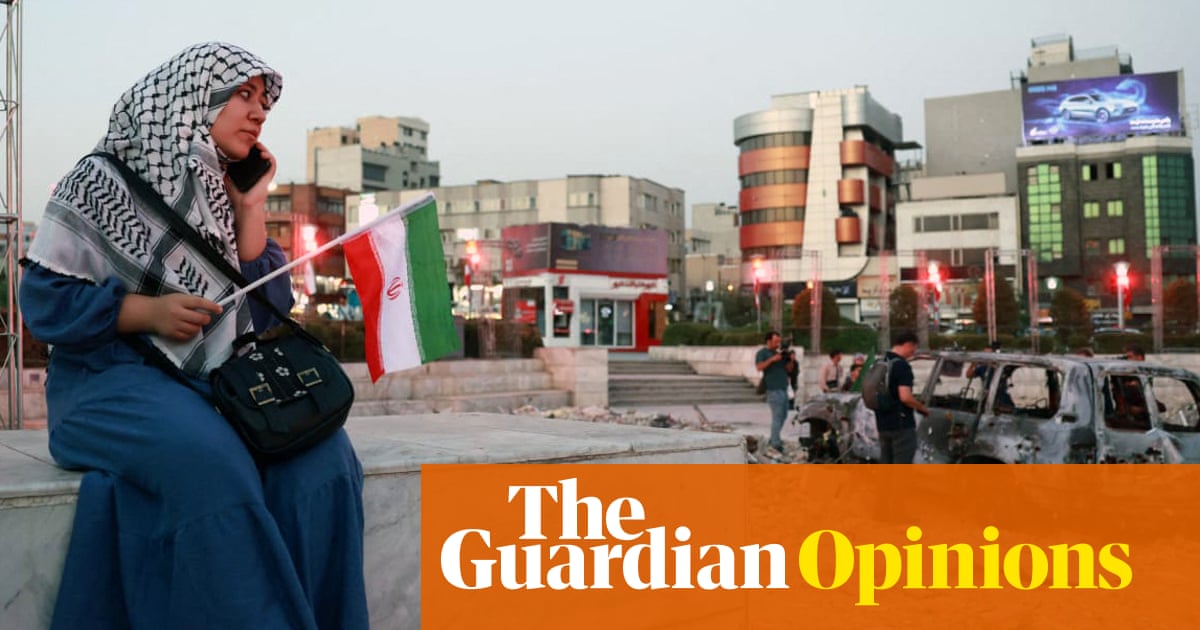On Monday morning Israeli airstrikes struck the Evin prison’s gate, damaging the court adjacent to the prison and some of the wards, including the women’s political ward where I spent five years. The prison holds a large number of political prisoners and opponents of the Islamic Republic in Iran. Nobody seems to know what has happened to them.
Since the bombing ofIranstarted 12 days ago, I have avoided the news and all requests for interviews. It has felt too sad. But as I was sitting at my desk, I saw the news about Evin popping up on my screen. My hands froze and I felt a shiver down my neck, just as when bad news landed back when I was held. After a couple of minutes I contacted my former Evin cellmates who arenow outside to check if they knew anything. They were as horrified and scared as I was.
We tried to get in touch with any of the families of prisoners we could find, to confirm their safety, but it was impossible. The ceiling had collapsed, there were reports of injuries and there were families shouting outside the walls. The UK does not even know how many British citizens are held in Evin, or where they have been moved. Meanwhile, Iran has started a tighter crackdown on civilians, including cutting the internet and makingmore arrests. Days are numb with helplessness and outrage.
When I was in prison, we experienced earthquakes, twice. There were power cuts as a result and we had to sit in the dark. Candles were not allowed and the emergency power rarely worked. It was horrid. Some women sat together praying, some sat in morbid silence. It felt as if we had died and we were praying over our own deaths. It felt as if anything could happen to us at that moment and there was no rescue. Prisoners are not a priority to the outside world when disasters come, but their lives matter to their loved ones.
Watching those prison doors being blown off felt surreal. I have walked in and out of that gate so many times, beingtaken to court or hospital, and always dreamed of the day when they would finally be opened and all prisoners would be set free from that place of oppression. So bringing down those gates might have seemed like a symbolic act for faraway media. But it did not feel like it made anyone safe inside. If anything, it took away lives. The crackdown from the Iranian authorities keen to reaffirm control feels as if it has only just begun.
The Iranian people have suffered decades of crimes by the Islamic Republic,which has violated their basic human rights, incarcerated thousands of people and executed many for standing up for themselves. Many of those are in Evin.
Back in 2022, I had a similar feeling when Evin was set on fire shortly after my freedom. It wasn’t joy but fear. I was desperate to get some news about my friends held there, terrified that something terrible would happen to them even as the prison burned. I asked a friend whose house overlooked Evin to video-call me and face the phone screen towards the window so that I could see the prison with my own eyes. There was no comfort in the flames, just fear of what was to come.
For so many of my family and friends, it is that same fear now, watching the games of governments we do not trust and the demonstrations of power with a sudden silencing of the protections of law. As Iranfalls apart, it is vulnerable people who are most exposed.
Over the past 12 days, we have all been glued to our phones hoping that what we saw was just a wild nightmare we would wake up from. It has been a shock. It started as unlawful bombing of Iran by Israel, though no one seemed to say it was unlawful. It has now escalated into a proper war against Iran with US intervention and the rhetoric of regime change. The mission creep has been unnerving, even for those of us who have suffered at the hands of the Iranian regime. The silence of the international community, including the UK, on this point has been worrying.
During my hostage case the UK’s reluctance to acknowledge the law and legal rights was frustrating for our family. But right now, the consequences are much greater. We run the risk of things getting much worse.
When I returned to Britain, Keir Starmer was one of the first people to greet me and get a picture. Two years ago he invited me to his Westminster office with other British-Iranian women’s activists on International Women’s Day and promised that his government would stand up for human rights in Iran. In opposition, there was no equivocation. But in government, there has been much more equivocation around the UK’s commitment to international law. Even yesterday there was a dangerous reluctance from Starmer’s ministers to criticise the illegality of allies joining in Israel’s war on Iran. The consequences are felt all around Tehran by families caught between a bomb and a hard place. They have felt very alone.
If Evin taught me anything, it was that freedom does not come from bombs and brutality, nor from clever stunts for the cameras. It lies in human connection and empathy. People in Iran, people across the Middle East – in prison and outside – could do with a bit more of that now.
Nazanin Zaghari-Ratcliffe is a British-Iranian dual national who was detained in Evin prison for five years
